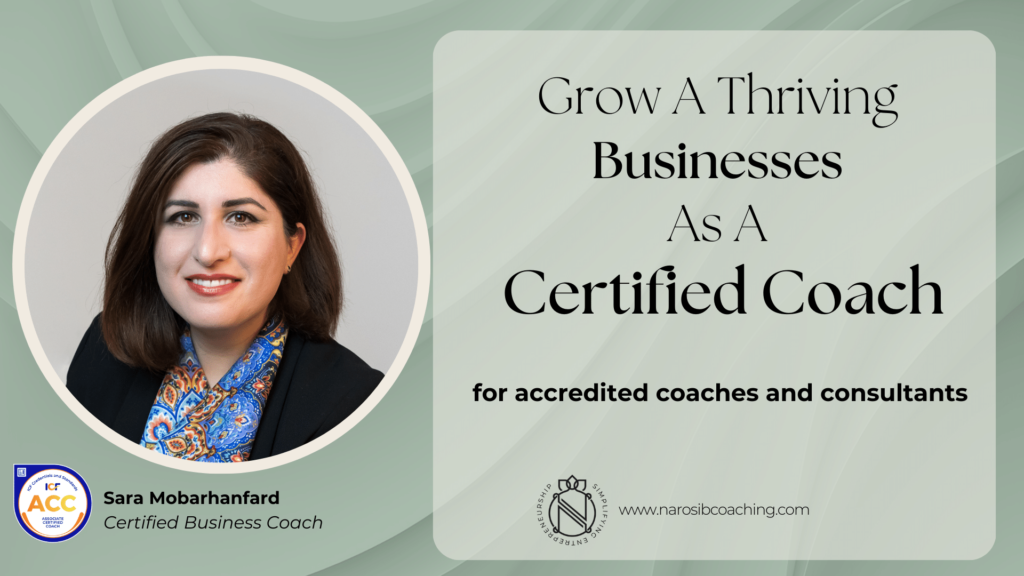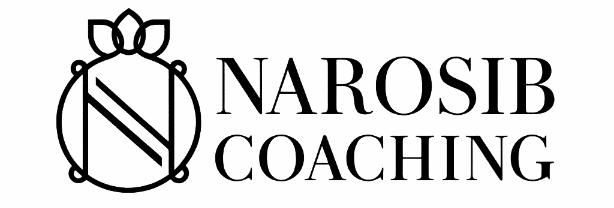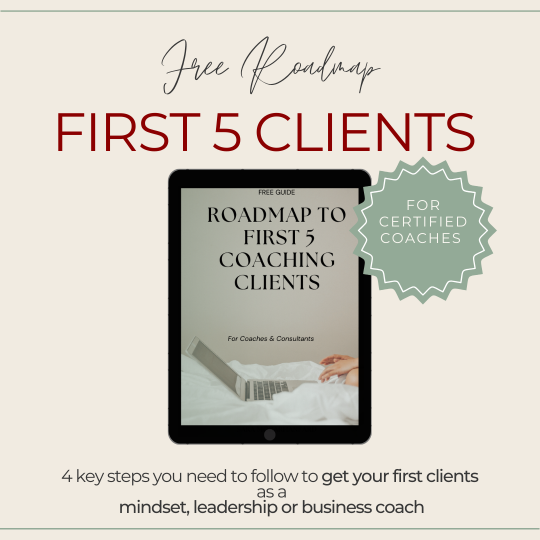
How to Get Coaching Clients as a Leadership Coach
Are you a certified coach who wants to get coaching clients as soon as possible?
Maybe you have served as an associate coach for an organisation and you are ready to also serve clients in your own private practice a sa self employed coach?
If you’re an aspiring certified leadership coach or a qualified consultant trained in leadership development and want to grow your business selling your expert services, this article is for you.
This guide will help you with the first key steps of getting coaching clients as a leadership coach and growing your own coaching business.
In my coaching practice I have helped over 140 entrepreneurs from all walks of lives and run different businesses.
In this article I am sharing insight that is more specific to leadership coaches, mindset or career coaches who serve high achievers & ambitious individuals in their businesses and careers.
You can also find a printable downloadable version of this guide here.
Table of Contents
Attracting Your Ideal Clients
The first natural step to grow your business is to attract those quality clients who value your expertise and are willing to invest—but this is easier said than done.
Attracting perfect-fit and ready-to-invest clients is a result of offering the right solution to the right clients and being able to articulate and communicate this value to them in a language they resonate with.
When you sell to the wrong audience and spend a lot of energy on convincing them to hire a coach, it’s very hard to sign even on client.
Instead of wasting your energy on persuading and convincing people on your solutions like old fashioned second hand car sellers, you can focus on attracting the “ready to invest and searching for a coach“
Selling to the right ideal client takes time, practice, and a lot of self-awareness around who you are, who you are most qualified to serve, and how in specific terms.
Many coaches misunderstand this step: Their marketing contains educational content that is targeted towards an overwhelmed stuck person who needs support, but is not ready to hire a coach specially on a 1:1 level.
Or their educational content is so heavy on using “coach language” and “coaching terminology” that it comes across as preachy and boring to their ideal clients. Instead it might attract an audience who is exploring a coaching career ( and no, they are not going to hire you, they will save their time and money for a coaching school!)

Being specific is another area where most coaches overlook in their marketing:
They talk too generically, focus too much on general coaching solutions and tools in their content with the hope that it showcases their expertise.
But their audience are not ready to hear about the coaching solutions and tools, they do not feel seen and heard. they do not resonate with their educational content.
Let’s look at an example.
Which of these statements are easier for you to connect with?
-
- “I am a mindset coach and I help overwhelmed entrepreneurs find clarity and success”
-
- “I am a leadership coach specializing in empowering female startup founders in the tech industry to build strong connections with investors, enabling them to secure the funding they need to grow their businesses.”
The second statement is easier to understand for the target audience.
The first statement which you probably have heard over and over, does not clearly show what kind of entrepreneurs are the target audience? Not every business owner resonates with the term entrepreneurs.
Startup founders?
What size of startup? in what industry?
online store owners? producers? service based businesses? product based boutique owners? coaches? what is the context here?
Success and clarity mean different things to different people : they are achieved differently.
Famous coaches with large audience such as Tony Robbins or Marie Forleo can get away with generic content , but you as a new coach who is expected to have a much closer deeper connection with clients probably can’t!
If you are active on social media and get alot of likes and comments from your coach friends, but no sales, then probably you are in the same trap!
Unfortunately, most marketing courses and business solutions out there don’t address this step in detail and assume you already have it.
So how to address your client’s needs and desires in specific ways?

Focusing on One Type of Ideal Client
Focusing on one type of client is often challenging for coaches, as they are often trained to solve a wide range of problems for almost everyone!
As a business coach, I have worked with clients from all walks of life with businesses in art, fashion, coaching, business consulting, and design. While I learned a lot from serving a diverse range of clients, I noticed how difficult it was becoming to market my services online.
My business only started to grow when I was able to focus my marketing efforts on one group of clients sharing the same pains and desires.
One group I knew a lot about and was excited to create content for.
The good news is that I didn’t need to give up serving other clients in the background;
Focusing on one type of client ( certified mindset & leadership coaches) helped me simplify my marketing and content creation process. In this guide, I am sharing those steps with you.
Figuring out who my target audience should be was a very long process for me: I only knew who I am most excited and qualified to work with after working with a diverse range of clients in different industries.
I didn’t spend months on researching what my niche should be: I coached as many people as I could and I had access to.

I noticed because of my own background and corporate experience, it’s easiest and most exciting for me to help leadership coaches grow their businesses.
Not only do I understand their clients well and can support them with their marketing content, but also it’s exciting for me to learn about leadership coaching.
These are some of the steps you can take to find your own ideal client:
Step 1: Identify Your Narrow Niche to Market To
Some marketing experts call this “nailing your niche.”
A niche is a specialized area or market segment that focuses on serving a specific group of people with distinct needs or interests.
You need to focus on one type of client you are most qualified and excited to serve so that you can describe your solution in specific terms.
Generic content and general advice are not powerful enough to connect with your target audience in the crowded coaching market.
To stand out, you need to be specific.
And “specific” happens when you focus on one type of audience and one type of need and desire that can be supported with your unique solution.
Here are some examples of different niches for leadership coaches:
-
- Middle Managers Seeking Promotion: Coaching middle managers to navigate the complexities of leadership and achieve their career advancement goals.
-
- Executive Presence and Communication: Helping C-suite executives enhance their presence, influence, and communication skills to lead effectively.
-
- Women in Leadership in Fintech: Coaching female leaders to overcome barriers and excel in traditionally male-dominated industries or roles.
-
- Leadership Transitions: Supporting leaders transitioning into new roles or positions within their organizations.
-
- Leadership Development for Tech Startups: Coaching founders and leaders in tech startups on effective leadership strategies tailored to the startup environment.
-
- Team Building and Collaboration: Focusing on building cohesive teams and fostering collaboration among team members to enhance overall performance.
-
- Leadership in Nonprofit Organizations: Providing leadership coaching to executives and managers in nonprofit sectors to navigate unique challenges and drive mission-driven outcomes.
-
- Leadership for Diversity and Inclusion: Coaching leaders on creating inclusive cultures and navigating diversity challenges within their organizations.
-
- Healthcare Leadership: Supporting healthcare professionals in leadership roles to manage teams, navigate regulatory challenges, and improve patient outcomes.
-
- Leadership in Educational Institutions: Coaching administrators and academic leaders in educational settings to enhance leadership skills and drive educational excellence.

In all the above examples you can even narrow down your niche by focusing on one type of industry, or professionals who work in certain types of companies if it makes sense
(startup? Small businesses? Family businesses? Scale ups? large corporations?)
As you can see, finding a niche is not about identifying a demographic but about knowing who you help , how and with what solution/ unique problem solving style.
Without knowing your niche, your business growth will slow down, and attracting quality clients will be challenging.
And especially if you want to grow your business online, as most digital marketing and online solutions are built on the foundation of “targeting a specific niche.”
This is how you position yourself as an expert coach in a specific field, making it easier to attract the right clients who value your unique skills and expertise.
Narrow down as much as possible and go for a group that you understand well enough to describe their needs, pains, and lifestyle.
To increase your success and profitability rate, you need to go for a niche you already have easy access to and feel excited to work with.

Step 2: Understand Your Ideal Clients’ pains and desires
Your ideal client is a member of your chosen niche.
Once you’ve identified your niche, it’s time to get to know your ideal clients on a personal level.
Coaching is a personal business!
Who are they?
What are their pain points and desires that you can understand?
How would those pains manifest in their lives, and what symptoms indicate those pains?
For example, losing sleep could indicate hidden stress they are unaware of, and your solution might help with their stress.
How do they think, feel, act, and behave before they invest in professional support?
What books would they read?
What podcasts would they listen to?
What bothers them about the situation they are in( and you help with)?
Understanding your ideal client inside and out will enable you to tailor your services to meet their specific needs, making you irresistible to them.
In step 1, you learned you need to go for a niche that you have easy access to.
Why?
Because you need to be able to reach out to them, interview them, and ask them questions about their needs.
You can start with reaching out to those whom you feel more comfortable talking to and have established trust with. You can offer them free consultations in exchange for an interview and learn more about their needs.

Step 3: Create an Irresistible Offer ( proposal)
Most coaches and consultants start with offering one-off sessions and follow what the client wants.
The goal of each session is often set at the beginning of that session, and clients choose to go for as many sessions as they want.
While this common client-led approach might be convenient for many, it doesn’t necessarily create the best transformational results for the clients.
It also makes it very difficult for the coaches to plan their capacity and income.
But what if you think of the desired long-term or mid-term transformations your clients want and help them create that change or achieve their desired goal within a specific timeline or structure?
With your niche and ideal client dialed in, it’s time to craft a proposal or offer that speaks directly to their wants and desires. By focusing on providing immense value and solving their biggest problems, you’ll make it impossible for them to resist working with you.
An “offer” is like a service package you give to someone to solve a problem or meet a need they have with a clear roadmap.
It’s like saying, “I can help you with this specific thing, and here’s how and what it costs for you.
“Key elements of an offer include:
-
- Clear solution: What problem does it solve or what needs does it meet?
-
- Value proposition: Why should someone choose your offer over others?
-
- Benefits: What will the person gain or achieve by accepting your offer?
-
- Roadmap to success: In what steps, stages, or from what angles are you helping your clients? Your signature methodology or framework will provide these steps.
-
- Features: What specific things are included in the offer? 1:1 or group coaching? Workbooks?
-
- Call to action: What do you want the person to do next to accept the offer? Book a discovery call? Create a payment?
Here is an example of one of my business coaching offers tailored to a client’s needs based on what we discussed in our initial call.
This client was an experienced leadership coach and busy mother who wanted to grow a coaching business on the side of her associate coaching assignment:
Example Of A Bespoke Plan for 5 Weeks 1:1 Coaching Program For A Client
This program includes 4 coaching sessions across 5 weeks so that we have at least 1 week of buffer time.
Session 1 (starting date of the program)
-
- Creating the ideal growth and learning space for you
-
- Goal setting
-
- Identifying your zone of genius for optimal productivity
-
- Identifying your ideal client profile and micro-niche for optimal focus and effective marketing
-
- Creating a plan for your mini-market research (pre-work for offer creation)
Session 2
-
- Creating your simple offer suite
-
- Creating the foundations for flexible, scalable, and irresistible offers
-
- Creating your methodology and framework
Session 3
-
- Authority marketing plan for your offers
-
- Finalizing your simple offer
Session 4
-
- Goal setting (client attraction, income, personal brand, thought leadership)
-
- Your 90-day action plan
These sessions are delivered within 5 weeks and I offer email and Voxer support in between sessions. The client can submit their work for review and feedback or ask questions.
This specific client is already experienced with marketing, that is why we can do so much in 4 sessions.
And that is why I love to support clients on a 1:1 level because I can always create a tailor made service based on their unique needs, lifestyle and budget.
By the way if you want to see how this process looks like for you, you can apply for a free success roadmap session with me.
Step 4: Market and Sell Your Offer to Your Niche
You don’t create that full-blown, grown-up business in one go!
Just like humans, businesses also grow in stages: transitioning from baby to toddler, teenager, and adult.
Every stage has its own needs and priorities.
Before you can grow a multiple 6 figure business with hundreds of clients, you need to know what to do to attract 4-5 clients and get confident with the process.
A baby does not need to worry about a job but needs love, support, and suitable nutritious food!
Your priority in your early days is to understand your ideal client, communicate with them in a way they can understand, and market and sell your solutions to them.
Make this as simple and fun as possible for yourself: talk about one problem at a time, offer one solution to one niche.
And before people buy from you, they need to know, like and trust you.
This will need you to have a visibility strategy and a marketing method that brings you in front of the eyes of the right people.
This could happen through sharing exciting content that connects with your audience on social media.
But you can also choose to grow your audience through partnerships,collaborations, running in-person events and strategic networking with influential decision makers in your field of work.
Be very intentional about every activity and how it contributes to selling your offer.
When people ask about your work and how you can support them, you can always guide them towards your offers or invite them to book a call with you.
This is how you attract your first (and next) 5 clients.
Leadership Coaching: A Diverse Client Base
Leadership coaches can serve a diverse range of clients in B2B and B2C context.
Sometimes they support individuals and teams with coaching, sometimes they deliver training and workshops to corporations.
Some focus on helping middle managers lead their teams more effectively, while others assist employees in securing promotions to leadership roles.
Others might specialize in executive presence, influence, and communication skills.
What makes business, leadership or executive coaching different is often your background and experience in the industry you work in.
Your personal experience may not be needed in the coaching sessions, but it creates trust and empathy between you and your clients.
Clients in these fields often seek more than just pure coaching, so make sure you bring other skills such as training, speaking,mentoring, consulting and experiences into your service.

Conclusion
If you want to know how to get coaching clients as a leadership coach, remember that it starts with identifying your niche, understanding your ideal client, creating an irresistible offer, and marketing effectively to your niche.
By focusing on these key steps, you can attract the clients who need your unique expertise and are ready to invest in their growth.
If you want to get a summary of this blog in the format of a printable PDF document click here.
If you want to watch my popular 45 min masterclass about growing a coaching business
Feel free to reach out to me on LinkedIn if you have any questions or need further support on your journey.



